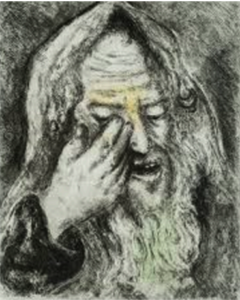Tisha B’Av
Monday, 12 August, 8:30pm
Please register for your personalised Zoom link.
 ‘Hear, all you peoples,
‘Hear, all you peoples,
And behold my agony:
My maidens and my youths
Have gone into captivity…
Who can heal you?’
(Lamentations 1:18)
Rabbi Alexandra Wright writes:The Book of Lamentations (in Hebrew Eichah) is a series of five lyrical elegies mourning the destruction of the First Temple in 586 BCE. Each of the first four chapters is structured as an alphabetical acrostic – a way of declaring both the immensity of the tragedy borne by the Jewish people (from ‘A to Z’), but also containing it within the vehicle of a poetic structure.
The final chapter is confessional and liturgical. Eichah is not simply rooted in historical time, it transcends the loss of the Temple and becomes Israel’s eternal lament for all catastrophes that befall our people, past, present and future.
The lament is for the city of Jerusalem, once ‘great among nations’, now she weeps ‘bitterly in the night, her cheek wet with tears.’ Her people have gone into exile, her roads are in mourning, empty of festival pilgrims, ‘her infants have gone into captivity before the enemy.’
Eichah speaks to us in our own time. Ravaged villages and desolate towns in Israel, empty of inhabitants, north and south, the anguish and tears of bereaved families; no vision from Israel’s leaders, enemies who hiss and jeer and gnash their teeth and cry: ‘We’ve ruined her! Ah, this is the day we hoped for; we have lived to see it.’
Eichah is the lament of a whole people mourning the ‘slaughter without pity.’ It is also an elegy by an individual shattered by grief, wrestling with faith in a God who seems to ‘bring down His hand again and again, without cease,’ who weighs down the poet with chains, who shuts out prayer, confuses and leaves the poet numb. Yet, this individual is not without hope. When morning comes, s/he is willing to sit patiently and to affirm faith in God’s goodness and mercy.
Eichah immerses us in the grief of national mourning. It moves us through a process of trauma and despair; it spells out graphically the horrors of destruction, death and captivity. But it is also penitential; it requires us to search and examine our ways, to confess transgression and rebellion, to seek forgiveness and to find a way back to moral purity, to goodness and hope.
This complex lament will form the centre of our liturgy and discussion on Erev Tisha B’Av as we reflect, together with other Liberal and Reform congregations, on the tragedies of the past and the most recent on 7 October.

